- Home
- Jack Canfield
Chicken Soup for the Soul of America Page 2
Chicken Soup for the Soul of America Read online
Page 2
They Took a Vote
Valor is a gift. Those having it never know for sure whether they have it until the test comes.
Carl Sandburg
The strength of a country comes from its people. It always has and always will. No matter what pomp and bravado a government shows, the solidity of the nation is directly determined by that of the individual citizen.
America has been shaken to its core by acts of terror. Many, including our president, have said we are strong, that we have resolve and that we will persevere. These words mean nothing to terrorists. Terrorists wait to see the actions of people, of individuals, to see if they will buckle and cower.
The cowards who killed our sisters and brothers, our mothers and fathers, our sons and daughters should know what happened on the flight they unsuccessfully tried to turn into a bomb over Pennsylvania. So should the rest of our fellow countrymen and women. In the history of this country of freedom, there has never been an event more emblematic of the values and heroism of the United States of America.
The flight had been hijacked, and was being turned around to be used as ammunition against innocent civilians at some unknown target in Washington, D.C. After some hurried cell phone calls to their loved ones, passengers learned of the World Trade Center attacks. They considered the consequences, then they took a vote together.
In that instant, they validated the great experiment of the United States of America. They voted. They affirmed the Declaration of Independence, the Constitution, our entire history of freedom, and gave meaning to every soldier who’s ever died in the service of this country. Faced with all of the threats that this country stands against, and in their own last hour, these Americans determined their path with a simple act of democracy, of freedom. They voted.
They voted to give their lives to save the innocent people for which the plane was headed.
Think about that for a moment. It’s the very definition of heroic. There is something else in that story, however, something incredible that should fill every American with pride. None of those American passengers took command. Nobody ordered them to attack the terrorists. Nobody forced them to follow along with the heroic insurgence.
Faced with death, tyranny, and terror, those Americans voted to sacrifice their lives for others.
September 11, 2001, is a day, as was said of Pearl Harbor, that will live in infamy. Thousands perished at the hands of cowards. We should never forget, however, that it was also the day that a few heroic patriots thousands of feet above Pennsylvania farmland sent a message to the entire world—our commitment to freedom and democracy, in the United States of America, is not wavering, it is not shaken, and it cannot be taken away by any act.
America is freedom.
Bill Holicky
Let Us Be United
September 10, 2001, was our eighth wedding anniversary. My husband, Alan, was leaving the next day for a week back in California to try his last Clean Water Act case. He’d decided to give up a thriving environmental law practice for a year’s sabbatical spending more time with family and offering volunteer work in India. We spent the day celebrating our love for each other, planning our future and counting the blessings in our lives. We were so grateful for our life together. Alan always said, “When we wake up each morning, we should feel gratitude for being alive.” And we did.
Alan woke up at 4:30 on Tuesday for his morning flight to San Francisco. As he kissed our five-year-old daughter Sonali and me good-bye, I pulled him toward me, knocking him over. He laughed heartily and said, “I’ll return with the pot of gold.”
“You are my pot of gold, Alan,” I said. “Come home safe and sound.”
He assured me he would, and at 7:00 A.M., he called to say he had checked in, he loved us, and he’d be back by the weekend.
And then it all began. . . . The CNN announcer confirmed that Flight 93 bound for San Francisco had crashed in a field in Pennsylvania. In that instant, I felt a crushing blow. Devastated, with the wind knocked out of me, I could barely get a sound out as shock and disbelief poured through my veins. My heart literally stopped beating and I had to will myself to live. How could my husband, my best friend who I’d kissed good-bye hours earlier, be dead?
When Sonali came home from school, I let her play for an hour before I told her the news. I wanted to savor the innocence of her not knowing Daddy was dead. When she heard Alan’s plane had crashed and he was not coming home, she wailed a cry so deep and heartbreaking, a cry I pray I will never hear again from any living being. She sobbed for an hour straight, and then she looked me in the eyes and said, “I am so sad. But I’m not the saddest girl in the world. Some children have lost their mommy and their daddy, and I still have you.”
A few days after the crash, Sonali’s brother Chris, concerned that Sonali might not understand what was really happening, asked her, “Do you know where Daddy is?”
“Yes, he’s at work!”
Chris was wondering how to handle this, when she continued. “Silly, he’s in court. Defending the angels.”
Sonali’s courage in the following weeks continue to amaze me and remind me of her dad. One of Alan’s final contemplations was a sentence he’d heard in a recent workshop, Fear—Who Cares? I know these words helped guide him on September 11.
Sonali and I attended a memorial service at the crash site in Pennsylvania with her older brothers Chris and John. Standing at the fence, staring out at the field and the scorched trees, I couldn’t help but notice what a beautiful place it was for him to die. Such an expansive countryside with golden red trees—this is where it all ended for Alan. Sonali picked up some dirt in her hands, folded her hands in prayer and began singing a beautiful hymn she learned in India the previous winter. Everyone stopped to listen to her. Then she held the dirt to her heart and threw it toward the plane.
As the sun peeked momentarily through the thick cloud cover, Sonali looked up and said, “There’s Daddy!” She drew a heart in the gravel and asked for some flowers, which she arranged beautifully around the heart with one flower in the center for her daddy.
News of Sonali’s courageous, sweet voice reached California, and we received a call from the governor’s office. Would Sonali like to sing at California’s Day of Remembrance?
“No, I don’t think so. She just turned five a few weeks ago, and there will be too many people.”
Sonali heard me and asked, “What am I too young to do?”
She listened to my reasons why not and simply said, “I want to do it.” I agreed. And in the next few days, Sonali’s repertoire of mostly Disney tunes expanded to include a beautiful prayer from the Rig Veda that we heard at the Siddha Yoga Meditation Ashram in New York where we were staying. Clearly, “Let Us Be United” was the perfect song for Sonali to sing:
Let us be united;
Let us speak in harmony;
Let our minds apprehend alike;
Common be our prayer;
Common be our resolution;
Alike be our feeling;
Unified be our hearts;
Perfect be our unity.
On the flight back to California, our flight attendant heard about where we were going and asked if Sonali wanted to sing her song for everyone on the plane.
A bit concerned, my mother asked Sonali, “Do you know how many people are on this plane?”
Sonali had no idea. So she took the flight attendant’s hand, walked up and down the aisle, and then came back with her guess. “About a thousand,” she said. “I can do that. I’ll be fine.”
In a clear, strong voice, Sonali sang to her fellow passengers. She then walked up and down the aisle with one of the crewmembers, receiving the smiles, thanks and love of all the United passengers. At the end of the flight, who stood on top of a box at the door with the flight attendant, thanking everyone and saying good-bye? Our Sonali!
When Sonali sang on the steps of the state capitol, her voice was unbelievably strong. It was as though she wanted to fill the whol
e universe with this impassioned prayer so it would reach her daddy. As she sang, I felt it also become a pure prayer to everyone gathered—a prayer that painted a vision. I was delighted when she asked me if she could sing again, this time for Alan’s memorial service at Grace Cathedral in San Francisco.
That wasn’t Sonali’s last singing prayer. When the Golden State Warriors awarded a check to the Beaven family at a fundraiser in their honor, guess who sang to thousands of people in their stadium? When asked how she was able to sing in front of so many people, Sonali said, “I wasn’t afraid because Daddy was singing with me.”
October 15th would have been Alan’s forty-ninth birthday, and Sonali wanted to have a birthday party for him. “Daddy’s favorite place is the ocean, so let’s go to the beach and have a big fire. Everybody can write a prayer on a piece of wood and when we put the wood in the fire, the prayers will rise to Daddy in heaven.”
And so we did. As sweetly as Sonali’s voice reached the heavens and so many hearts, so, too, our love rose into the moonlit sky. Alan’s courage and spirituality are so strongly reflected in Sonali’s ability to rise above her own heartbreak and loss and uplift people. Just as Alan didn’t sit back in his seat with shaking knees but rose fearlessly to help save thousands of people’s lives, so, too, Sonali chose not to bury herself in grief, but to sing her dad’s vision of love and courage. I am grateful for them both!
Kimi Beaven
[EDITORS’ NOTE: When Manhattan singer/composer Anne Hampton Callaway heard the Vedic prayer, “Let Us Be United,” she was inspired to put it to music. Later, Anne recorded the song with Sonali and members of the Siddha Yoga International Choir. “Let Us Be United” is available through the SYDA Foundation at (888) 422-3334 or at www.letusbeunited.org where you can hear a preview. All proceeds will go to support the work of nonprofit organizations, including Save the Children, the SYDA Foundation and The PRASAD Project. For specific information regarding these organizations, please see the previously mentioned Web site.]
Contributions to The Alan Beaven Family Fund can be sent to 2000 Powell St., Suite 1605, Emeryville, CA 94608.
Sonali sings at the California Day of Remembrance.
San Francisco Chronicle/Darryl Bush.
Do Unto Others
Courage is not the absence of fear, but rather the judgment that something else is more important than fear.
Ambrose Redmoon
Of all the sadness that came out of September 11, one story shines like a jewel in the dust. It is a story of giving and receiving—a story of saving and being saved and not knowing which is which—the story of the firefighters of Ladder Company 6 and Josephine.
More than three hundred firefighters perished in the tragedy of the World Trade Center. On September 29, at a time when the country was desperate for good news, NBC Dateline reported “The Miracle of Ladder Company 6.” By the time I sat around their table in the back of the firehouse two weeks later and heard them recount it, the firefighters of Ladder 6 had said these words many times, but every word was still flooded with the vibrant sound of their gratitude.
They had gone to the World Trade Center that day to give. To rescue. That’s what firefighters do. They run into burning buildings against instinct and nature, while the rest of us are running out, trying to save our own lives. They had entered the building at Number One, as had so many of their brothers, after the first plane had mortally wounded it. People were streaming down beside them, saying words of thanks and encouragement to them, offering them drinks from the machines and telling them they should get a pay raise.
They, in turn, offered words of encouragement back. “It’s over for you,” the firefighters said to those lucky enough to be exiting. “Go out through the lobby and go home now. You’re okay.”
The stairwells were narrow, only room enough for one person to move past another in either direction. Each of the firefighters climbing the steps carried at least a hundred pounds of equipment. At the twenty-seventh floor, some of them learned that the other tower had gone down, and the effort to save the building was rejected for the more pressing job of saving the people. Somehow in all the confusion, somewhere between the twelfth and fifteenth floors, the men of Ladder 6 were entrusted with the safety of a sixty-year-old bookkeeper named Josephine Harris. Josephine worked on the seventy-third floor, and she had been trudging down those sixty flights of steps through smoke and heat until her desire and ability to go on seemed completely exhausted.
Now getting her safely out was their assignment. So, despite her unwillingness to continue down the stairs, the firefighters encouraged her on. They reminded her of her grandchildren, who were waiting for her when she escaped the building. They told her she could do it. They cajoled. They encouraged. They promised to get her out if she would just keep moving.
On the fourth floor, she finally stopped in her tracks. She could not take another step. Would not take another step. She seemed willing to let them go on without her, but she was done walking. Never even thinking about leaving her, the firefighters began looking around for a chair on which to carry her down the rest of the stairs.
They were tired, too, and burdened by the heat and the weight of their equipment, and they were anxious to evacuate the building. But because some of them were not aware of the other building’s collapse, and because the towers had always seemed somehow immortal, they did not feel at that moment that there was great urgency.
None of them expected the terrible, otherworldly, thunderous sound; none of them expected the rumble that, in an instant, signaled catastrophe. Time stands still at moments like that. They stretch out long enough to give people pause, to consider what dying would mean. Bill Butler thought, I didn’t even get to say good-bye to my wife and kids. Clearly, this was it. They had done their best, and now it was over. They prayed for it to be over quickly; they repented and asked for forgiveness; they thought of loved ones.
And then everything turned to dust around them. One hundred and five floors above them came tumbling down, each crushing the one under it with greater force. Within seconds the proud, shiny tower had been turned to sand-sized pieces of rubble, taking thousands of lives in its shattering wake.
From all vantage points, there was no way for anyone to survive this disaster, and no obvious reason why the staircase at which Josephine had halted should have been spared. But miracles have their own reasons. And as the dust settled, Captain John (Jay) Jonas, Sal D’Agostino, Bill Butler, Tommy Falco, Mike Meldrum, Matt Komorowski and Josephine, thrown wildly through the debris, were left whole, if not exactly standing, seemingly buried alive.
For four hours they were trapped in the rubble, wondering what was happening around them and how long they would be trapped. D’Agostino found a can of Sunkist orange soda, which seemed a drink of the gods to the thirsty team. Josephine was “a trooper,” D’Agostino said of her. He offered her a drink and she declined, being brave and stoic. When, after a while, she said she was cold, Falco gave her his coat and even held her hand when she said she was scared. They had no idea what was happening around them; they could only hope that there were efforts being made to find survivors. Little did they know how ecstatic firefighters would be to discover that anyone had survived this disaster. Little did they know that the search for them was frantic and urgent for all concerned—those lost and those desperate to find them.
While they waited, some of them methodically repacked the rope in case they would need it later, a routine that now gave them something to do. A cell phone played a part in the outcome, as it had in the tragedy of Flight 93. This time it was when Butler, who couldn’t reach the firehouse through all the chaos of the phone system, called his wife. She called the firehouse and let them know of the plight of the missing men.
Finally, they were found. Rescued.
But it had been an intense time that they had shared with Josephine, and the six were not ready to turn her over to another company. D’Agostino said that when a firefighter finally discove
red them there, he was so pumped up that he rushed to take Josephine from them, calling her “Doll” and saying, ‘We’ll take care of you, Doll. We got you.”
But after all those hours of sharing the limbo between life and death with her, it seemed to them inappropriate not to give her the honor due her. D’Agostino said he grabbed the rescuer’s arm and explained, “Her name isn’t Doll. Her name is Josephine.” When he thinks of it now, he shakes his head. Even in the midst of the excitement of recovery and the terrible fright through which each soul had journeyed, the other firefighter recognized the holiness of the moment and apologized, saying, “Sorry, Josephine, we’ll take good care of you.’”
Ultimately, because special equipment was required to remove her from the wasteland that Ground Zero had become, Josephine was taken away from the men of Ladder 6 and they parted.
As I sat around the table with Sal and Mike and Bill and Tom and listened to them tell it one more time, I could see that the talking about it was part of the process—that we understand so much through stories. They had a reunion with Josephine at a later date, gave her a special jacket and called her their “guardian angel.” While she says that they saved her life, they contend the opposite. They believe that by insisting that they stop there at that spot, at the only place left standing at Ground Zero, holding it as a sacred space, Josephine had saved their lives.
Judith Simon Prager
Reprinted with permission of Marshall Ramsey. ©2001 Copley News Service.
A Hero for Our Time
It was New York City’s worst week.
But it was New York City’s best week.
We have never been braver.
We have never been stronger.
Mayor Rudolph Giuliani
In the days before September 11, 2001, America was a little short on role models. Oh, we had basketball players, rock stars and millionaires, but there was a dearth of larger-than-life, genuine heroes. In those carefree, careless days, we had no one to show us how to be: how to be brave, how to be kind, how to be generous, how to be valiant.

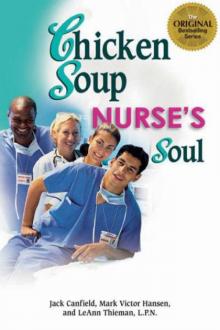 Chicken Soup for the Nurse's Soul: Second Dose
Chicken Soup for the Nurse's Soul: Second Dose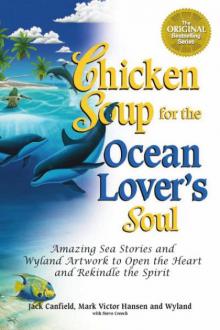 Chicken Soup for the Ocean Lover's Soul
Chicken Soup for the Ocean Lover's Soul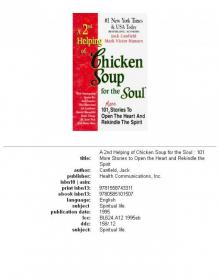 A 2nd Helping of Chicken Soup for the Soul
A 2nd Helping of Chicken Soup for the Soul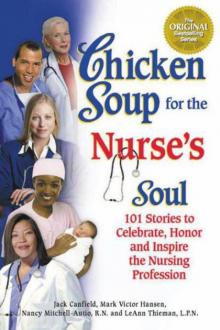 Chicken Soup for the Nurse's Soul
Chicken Soup for the Nurse's Soul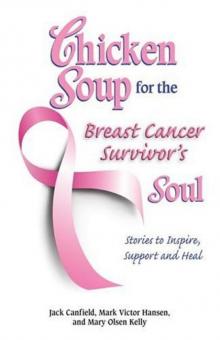 Chicken Soup for the Breast Cancer Survivor's Soul
Chicken Soup for the Breast Cancer Survivor's Soul Chicken Soup for the Pet Lover's Soul
Chicken Soup for the Pet Lover's Soul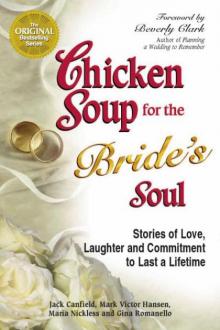 Chicken Soup for the Bride's Soul
Chicken Soup for the Bride's Soul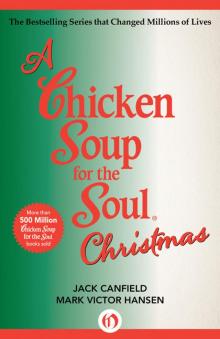 A Chicken Soup for the Soul Christmas
A Chicken Soup for the Soul Christmas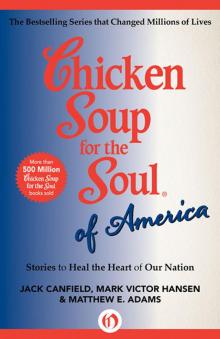 Chicken Soup for the Soul of America
Chicken Soup for the Soul of America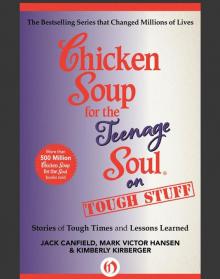 Chicken Soup for the Teenage Soul on Tough Stuff
Chicken Soup for the Teenage Soul on Tough Stuff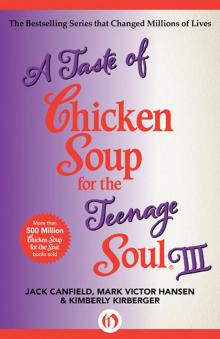 A Taste of Chicken Soup for the Teenage Soul III
A Taste of Chicken Soup for the Teenage Soul III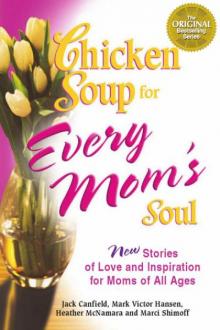 Chicken Soup for Every Mom's Soul
Chicken Soup for Every Mom's Soul Chicken Soup for the Dog Lover's Soul
Chicken Soup for the Dog Lover's Soul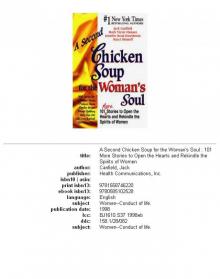 A Second Chicken Soup for the Woman's Soul
A Second Chicken Soup for the Woman's Soul Chicken Soup for the Soul the Book of Christmas Virtues
Chicken Soup for the Soul the Book of Christmas Virtues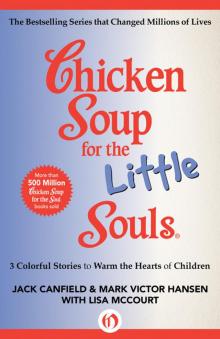 Chicken Soup for the Little Souls: 3 Colorful Stories to Warm the Hearts of Children
Chicken Soup for the Little Souls: 3 Colorful Stories to Warm the Hearts of Children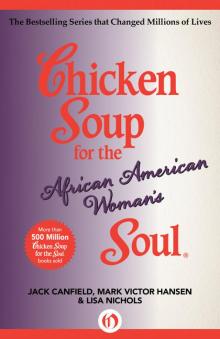 Chicken Soup for the African American Woman's Soul
Chicken Soup for the African American Woman's Soul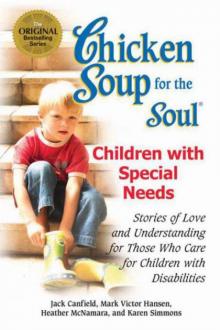 Chicken Soup for the Soul
Chicken Soup for the Soul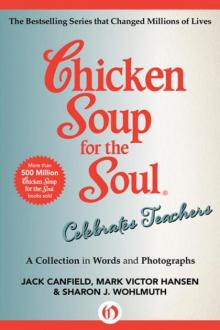 Chicken Soup for the Soul Celebrates Teachers
Chicken Soup for the Soul Celebrates Teachers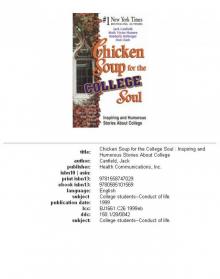 Chicken Soup for the College Soul
Chicken Soup for the College Soul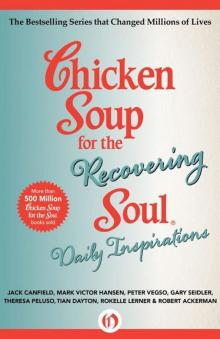 Chicken Soup for the Recovering Soul Daily Inspirations
Chicken Soup for the Recovering Soul Daily Inspirations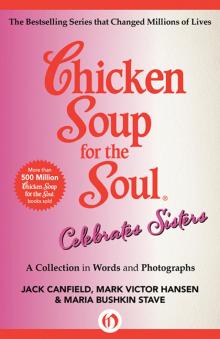 Chicken Soup for the Soul Celebrates Sisters
Chicken Soup for the Soul Celebrates Sisters Chicken Soup for the Dieter's Soul
Chicken Soup for the Dieter's Soul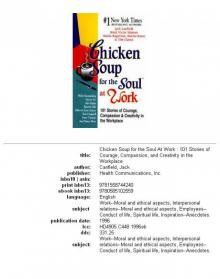 Chicken Soup for the Soul at Work 101 Stories of Courage
Chicken Soup for the Soul at Work 101 Stories of Courage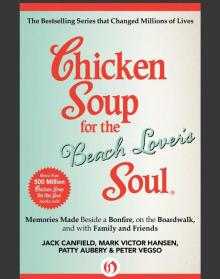 Chicken Soup for the Beach Lover's Soul
Chicken Soup for the Beach Lover's Soul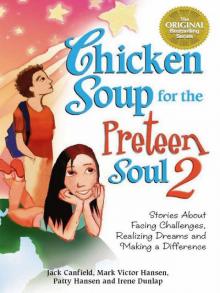 Stories About Facing Challenges, Realizing Dreams and Making a Difference
Stories About Facing Challenges, Realizing Dreams and Making a Difference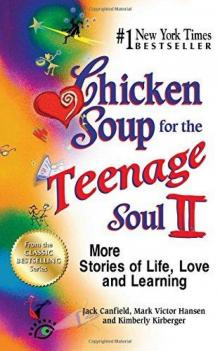 Chicken Soup for the Teenage Soul II
Chicken Soup for the Teenage Soul II Chicken Soup for the Girl's Soul
Chicken Soup for the Girl's Soul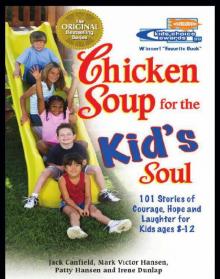 Chicken Soup for the Kid's Soul: 101 Stories of Courage, Hope and Laughter
Chicken Soup for the Kid's Soul: 101 Stories of Courage, Hope and Laughter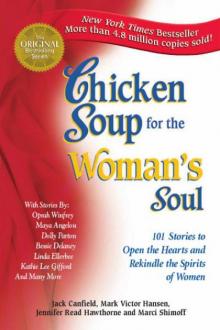 Chicken Soup for the Woman's Soul
Chicken Soup for the Woman's Soul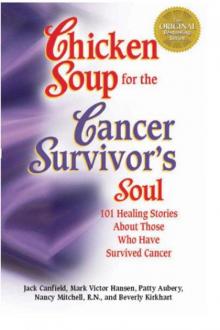 Chicken Soup for the Cancer Survivor's Soul
Chicken Soup for the Cancer Survivor's Soul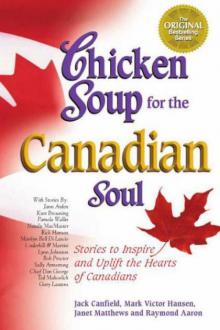 Chicken Soup for the Canadian Soul
Chicken Soup for the Canadian Soul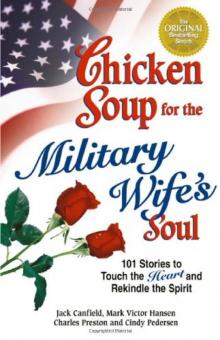 Chicken Soup for the Military Wife's Soul
Chicken Soup for the Military Wife's Soul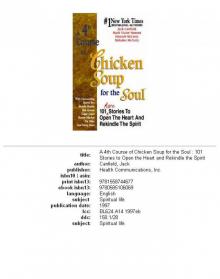 A 4th Course of Chicken Soup for the Soul
A 4th Course of Chicken Soup for the Soul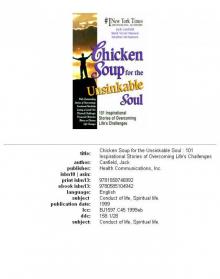 Chicken Soup Unsinkable Soul
Chicken Soup Unsinkable Soul Chicken Soup for the Soul: Christmas Magic
Chicken Soup for the Soul: Christmas Magic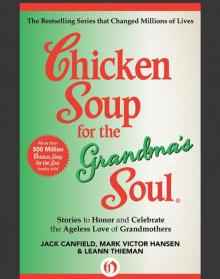 Chicken Soup for the Grandma's Soul
Chicken Soup for the Grandma's Soul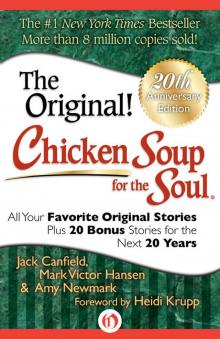 Chicken Soup for the Soul: All Your Favorite Original Stories
Chicken Soup for the Soul: All Your Favorite Original Stories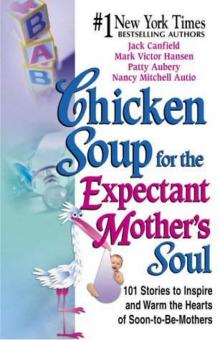 Chicken Soup for the Expectant Mother's Soul
Chicken Soup for the Expectant Mother's Soul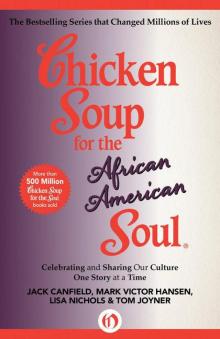 Chicken Soup for the African American Soul
Chicken Soup for the African American Soul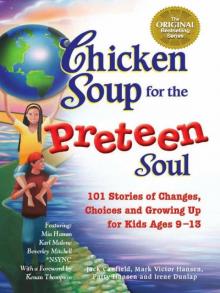 101 Stories of Changes, Choices and Growing Up for Kids Ages 9-13
101 Stories of Changes, Choices and Growing Up for Kids Ages 9-13 Christmas Magic
Christmas Magic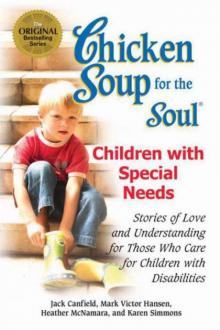 Chicken Soup for the Soul: Children with Special Needs
Chicken Soup for the Soul: Children with Special Needs Chicken Soup for the Soul: Country Music: The Inspirational Stories behind 101 of Your Favorite Country Songs
Chicken Soup for the Soul: Country Music: The Inspirational Stories behind 101 of Your Favorite Country Songs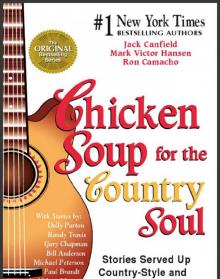 Chicken Soup for the Country Soul
Chicken Soup for the Country Soul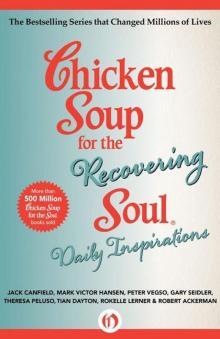 Chicken Soup for the Recovering Soul Daily Inspirations (Chicken Soup for the Soul)
Chicken Soup for the Recovering Soul Daily Inspirations (Chicken Soup for the Soul)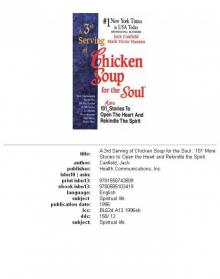 A 3rd Serving of Chicken Soup for the Soul
A 3rd Serving of Chicken Soup for the Soul The Book of Christmas Virtues
The Book of Christmas Virtues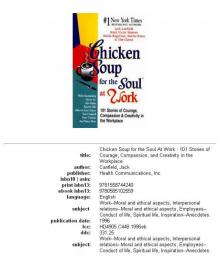 Chicken Soup for the Soul at Work
Chicken Soup for the Soul at Work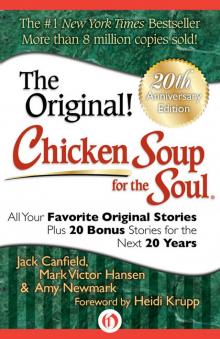 Chicken Soup for the Soul 20th Anniversary Edition
Chicken Soup for the Soul 20th Anniversary Edition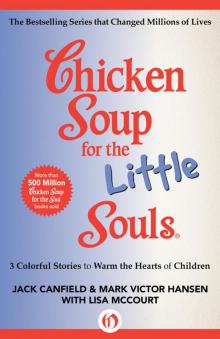 Chicken Soup for the Little Souls
Chicken Soup for the Little Souls Chicken Soup for the Soul: Reader's Choice 20th Anniversary Edition
Chicken Soup for the Soul: Reader's Choice 20th Anniversary Edition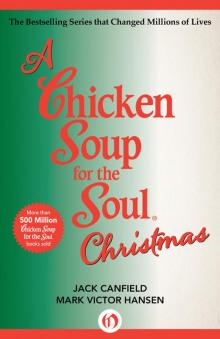 Chicken Soup for the Soul Christmas
Chicken Soup for the Soul Christmas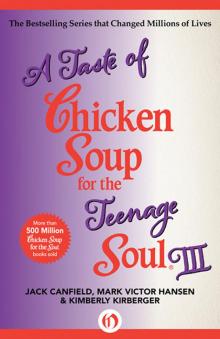 Taste of Chicken Soup for the Teenage Soul III
Taste of Chicken Soup for the Teenage Soul III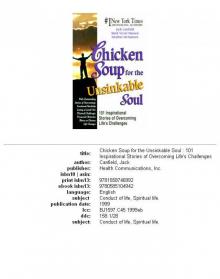 Chicken Soup for the Unsinkable Soul
Chicken Soup for the Unsinkable Soul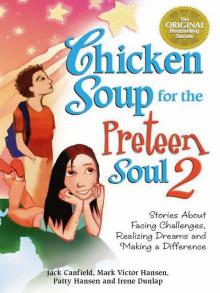 Chicken Soup for the Preteen Soul II
Chicken Soup for the Preteen Soul II